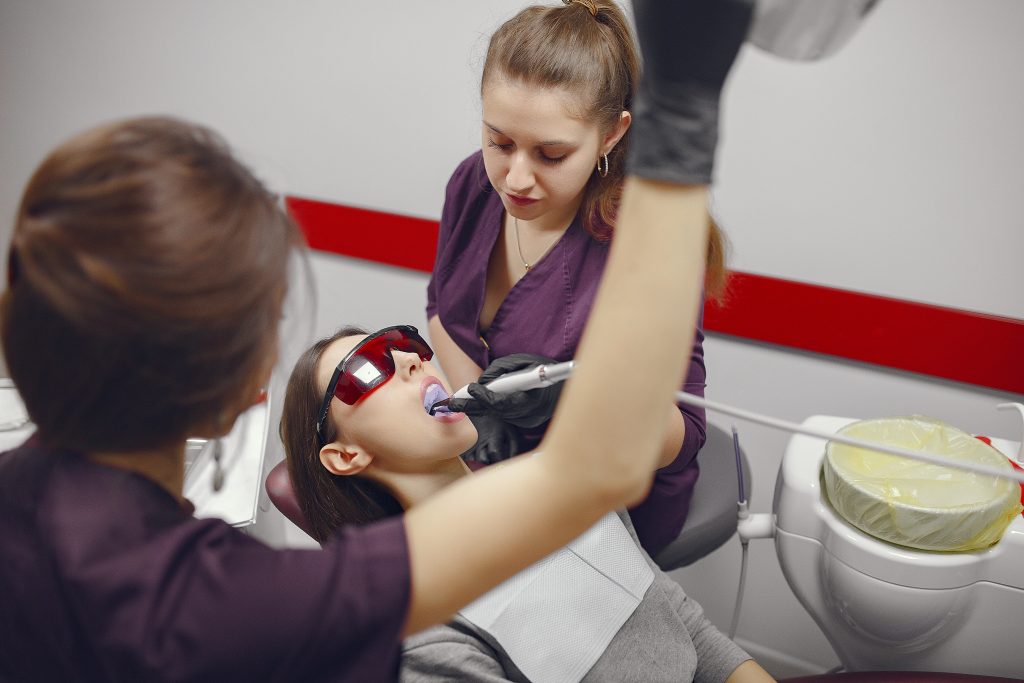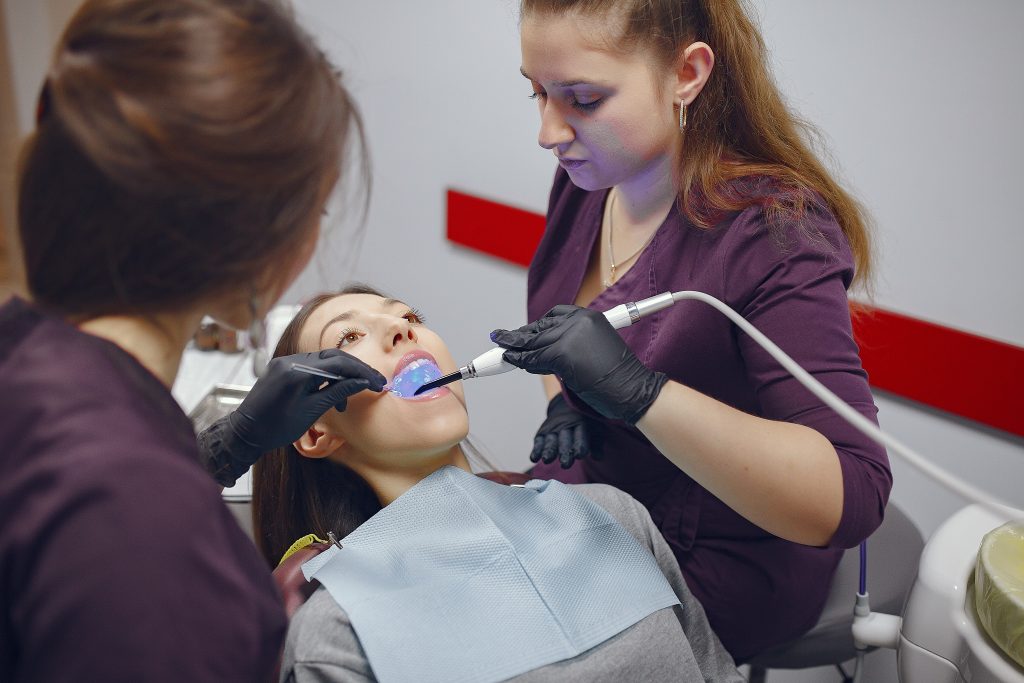Treatments
Receding Gums Treatment in Lahore
Do you have a receding gums problem? Not to worry. Gum recession is one common dental problem that can be detected and prevented. The process of gums receding doesn’t happen fast enough that most people even realize they have the condition. Also, it can be a very common cause of tooth sensitivity.
Receding gums are risky to health because they expose the roots of the teeth and expose them to decay, infections, tooth loss or even the appearance of yellow teeth. In the end, everybody is recommended to see a dentist immediately for an oral health problem. If you are experiencing gum problems you need to call up the dentist and book an appointment to get the best treatment for receding gums today!
Symptoms of Receding Gums
- Fear of tooth loss
- Causes of being sensitive to hot or cold foods because of exposed tooth roots
- Concern of how the teeth should look as they agree, and where they should be spaced
- Bad breath
- Bleeding gums


Causes of Receding Gums
- Your genes
- Brushing too hard or incorrectly
- Hormonal changes
- Not visiting your dentist or hygienist frequently
- Smoking
- Grinding or clenching your teeth
- Crooked teeth
Treatments to Reverse Gum Diseases
This is what leads to changes in the texture and color of gums; they become more sensitive and may start bleeding, and so is the case with tooth loss due to loss of gum tissue. However, if you are suffering from this, there is no way you will be able to regain more of those gums unless you pursue treatment for receding gums.
Treatments for Early-Stage Receding Gums:
In some instances, at the beginning of the treatment, you may be prescribed non-surgical therapy. These include:
Deep Cleaning: These procedures are done to reach subgingival plaque and calculi and will eliminate inflammation and cease further gingival recession.
Antibiotics: At times, your dentist may put you on antibiotics that would eradicate the bacteria and enable the controlling of gum disease.
Treatments for Advanced Gum Recession:
In cases where the gum recession is slightly worse, you may require receding gum surgery. Common surgical options include:
Gum Grafting: The exposed tooth roots are covered with tissue imported from another part of the mouth, or donor site.
Pinhole Surgical Technique: A procedure where stripped gum tissue is rolled back into position over an area of recession in a surgical way.
Receding Gums and Dentures
Ill-fitting dentures can also cause gum recession. It has to be a good fit since it is difficult to correct ill-fitted dentures without making the problems with the gums worse. But regular visits are just as important as the other adjustments you need to ensure the life of your dentures.
No matter whether you use non-surgical methods or receding gum surgery if you can stop your gum disease before it gets too out of hand, it will remain so.
What Next
Hop on our website and explore more from simple treatment to receding gum surgery. Plan your appointment and start treating your receding gums the way they deserve.
FAQs
01. What is the cost of receding gums treatment?
The treatment cost for receding gums will depend on the severity of the condition. The worse the case is, the more expensive the treatment will be.
Therefore, it becomes highly important to visit a dentist if you feel any symptoms. They can assess your condition, and suggest relevant treatment solutions.
02. Why do gums recede?
Gums may recede for various reasons. Many of the causes cannot be prevented. However, some are worse than others.
You may be predisposed to recession by your genes or perhaps result from gum disease or poor oral hygiene. If your gums are recessing, then you should visit a dentist once.
03. What happens when your gums recede?
In many cases, receding gums present in the form of a sensitive tooth; the length of the tooth or the space between adjacent teeth is changed. It may result from the presence of some other diseases: gum disease or periodontal disease.
In time, untreated receding gums bring more complicated issues – bad breath, blood clots, rotting, and even some tooth loss. Be sure to reach your dentist as soon as any signs show up.
04. What to do if my gums are receding?
Your dentist will recommend you treatment according to the condition of your gums. He might suggest a removal or a filling. It is therefore so easily recommended that early intervention should be sought. Gum recession is diagnosed dependent on the degree or extent of its visibility from the teeth top and your dentist will let you know the best way forward regarding a treatment plan.
05. How do you stop receding gums?
Good oral hygiene practices may prevent it. Gum recession could be brought about by gum diseases, typically due to poor oral hygiene practices. Regular dental checkups and proper oral care practice guarantee that gum disease is prevented.
Controlling gum disease involves brushing one’s teeth twice a day, flossing regularly, following a good diet, and quitting smoking. Even though it cannot be prevented through gums recession due to other conditions such as hormonal changes or genetic cases, it is still good that you consult your doctor sooner rather.
06. How are receding gums treated?
If you notice something different with your teeth and gums, make an appointment or call your dentist, to avoid any further complications. Your No 1 priority should be good oral care and regular visits to the dentist and hygienist. And if the condition is severe, the treatment course will depend on what it is.
Options are:
- Using desensitizing or bonding agents to calm the sensitivity of the exposed root.
- Compositional restorations placed over the root surface.
- Orthodontic treatment to align and straighten the teeth with easier cleaning gradually.
- Oral surgical measures, including gum tissue grafting. An oral surgeon grafts tissue from another part of your mouth.
07. How do I reverse receding gums naturally?
Most of the time, gum recession cannot be prevented by natural means. However, there are remedies applied in cases where there is gum recession. Improved oral health is among the remedies. If you have advanced gum diseases or any other serious disease in your mouth to causes gum recession, you have to see a dentist or an oral surgeon for a professional remedy.
08. Can receding gums grow back?
You cannot regrow your gums if they are already destroyed. However, you can help prevent the condition from worsening. You should contact your dentist for the recommendation of the appropriate treatment for you. In severe cases, a deep cleaning procedure or surgery could become necessary.
09. Can receding gums be repaired without surgery?
The amount of your gum recession will determine if you would need surgery to fix it. Your general dentist should be able to scale and plan the roots, more commonly known as deep cleaning, to treat minor cases of receding gums.
Your dentist will make sure to remove all plaque and tartar from below the gum line on your teeth’s root surface, smoothing out the exposed area of your roots to prevent future bacterial growth. She might prescribe you an antibiotic to confirm there are no bacteria.
10. Is there any treatment for receding gums?
Yes, indeed various treatment procedures are available for those patients with receding gums. Superficial types of access may be treated using non-surgical approaches such as scaling and root planing accompanied by oral hygiene.
In more severe scenarios, the surgical options for receding gums include gum graft or the new pinhole surgical technique for regrowth of the gum tissue. Your dentist will decide the best course of action that will be most suitable for you depending on your situation.

